PDF chapter test TRY NOW
There are two characters in the poem: the speaker and her special hero.

The speaker and her special her
The poem starts with the speaker declaring how her special hero would hold her in his arms when she was a baby. Hence, it is understood that the special hero had known the speaker since she was an infant. Besides, we could also see that he was way older than her as he could (or rather, allowed to) hold a baby.
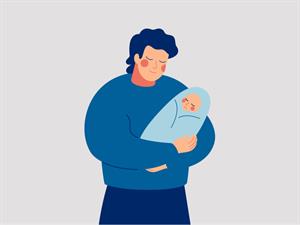
The special hero holding the speaker in his arms
Speaking of the special hero, the speaker recollects how she received all the love and care from him; he loved the speaker very dearly. Furthermore, the speaker had felt safe in his arms. Hence, the speaker thinks that the special hero had protected her from dangers of any kind.
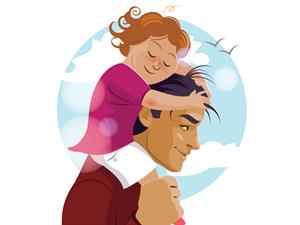
The speaker had received love and protection from her special hero
From the above lines, we could see that the speaker feels love, trust, and gratitude towards her special hero.
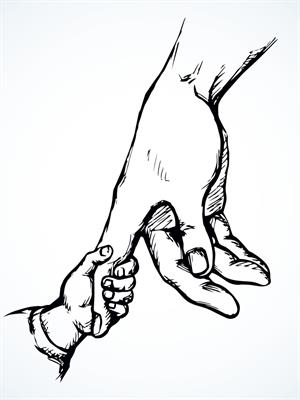
The speaker feels love, trust, and gratitude
The speaker says that she would be able to see the love in the eyes of her special hero. She could see all his love when she looks up into his eyes.
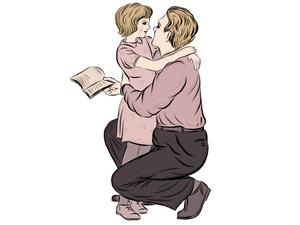
The speaker could see love in the eyes of her special hero
One could observe that the speaker had placed a lot of emphasis on the love expressed by her special hero. Love seems to be the most cherished attribute of the person. Also, it was the love that made her feel safe in his arms.
As the poem progresses, we learn that the special hero is none other than the speaker's father. She says that she feels so lucky to have him as a dad. She writes, "how did I get so lucky, you were the dad chosen for me."

The dad looks at her daughter with love (top); the girl sees her father as a hero (bottom)
As humans, we are bestowed with so many powers; one can get almost anything in the world, as long as we have sufficient money or know the ways to earn it. However, one would feel incomplete and empty without love. To the speaker, it was not merely the father, but rather a father who could love her absolutely, that made her feel lucky. As Oscar Wilde had once said, "who, being loved, is poor?"* The unconditional love and care from the father had probably made her childhood worth remembering.
The speaker says how a father's love is very special. Here, the speaker is not merely talking about the love between her and her father, but rather about father's love in general.
As the saying goes, 'there is no love greater than that of the parents'. One could observe how the speaker had been stressing on the aspect, with father's love in particular. As Émile Gaboriau has said, “a father is the one friend upon whom we can always rely."**
As the saying goes, 'there is no love greater than that of the parents'. One could observe how the speaker had been stressing on the aspect, with father's love in particular. As Émile Gaboriau has said, “a father is the one friend upon whom we can always rely."**

A father's love is special
The speaker believes that the father's love is divine; it didn't appear from a random place but came from 'someplace up above’. Here, the phrase 'someplace up above' refers to heaven, the place where God resides. Hence, the line could mean that the father (and the love) were sent to the speaker by God.
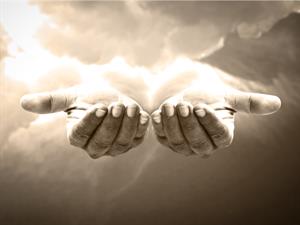
Love was sent from someplace up above
The idea that the love came from God had also echoed in a line from the previous stanza. The speaker speaks about how she feels lucky to know that he was the father chosen for her. Here, the word 'chosen' suggests that there was a set of divine hands at play. So, the speaker feels that she has been blessed with her father's love.
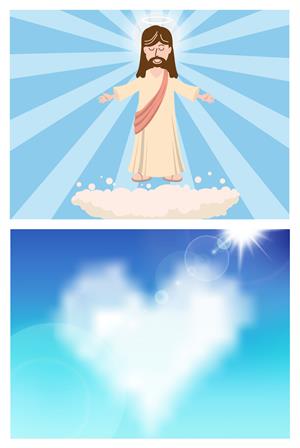
Father's love made the speaker feel truly blessed
However, the line "seems it was sent to me / from someplace up above" may suggest a deeper meaning. Calling it love from heaven, the speaker could be referring to God. Since the poem is about a father's love, it is possible that the speaker was talking about God the Father. In various religions and Christianity in particular, God is often addressed as Father. Hence, the poem might be an expression of the speaker's love and faith in her God.
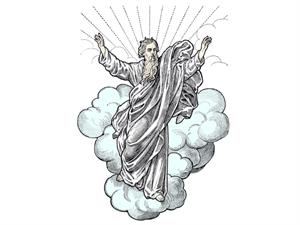
God the Father
The speaker declares that the love that the father and the daughter share is everlasting. She wants her father to know that there is no end to the love she has for him. The bond between a parent and a child is hard to break, and the love stays on.
Again, the everlasting love that the speaker was speaking about echoes several lines from "The Bible". For instance, Psalm \(136:26\) talks about how "his (God's) steadfast love endures forever". Moreover, Indian philosophy also compares father to God. It says "Pitru Devo Bhava", which means Father is equal to God". The reason for such an idea could be simple: a father can love and protect his child like a God without expecting anything in return.
Again, the everlasting love that the speaker was speaking about echoes several lines from "The Bible". For instance, Psalm \(136:26\) talks about how "his (God's) steadfast love endures forever". Moreover, Indian philosophy also compares father to God. It says "Pitru Devo Bhava", which means Father is equal to God". The reason for such an idea could be simple: a father can love and protect his child like a God without expecting anything in return.

A father can love and protect his child like a God
Finally, the speaker concludes the poem by reinforcing the poem’s central theme: father is indeed the speaker's special hero. No matter who comes into her life, her father would always be a hero in her eyes. She says she wanted her father to know how much admiration and love she has for him.

The daughter's special hero is her father
Reference:
* http://www.literaturepage.com/read/woman-of-no-importance-69.html#:~:text=But%20we%20are%20very%20poor,Oh%2C%20no%20one.
** https://www.goodreads.com/quotes/586335-a-father-is-the-one-friend-upon-whom-we-can
